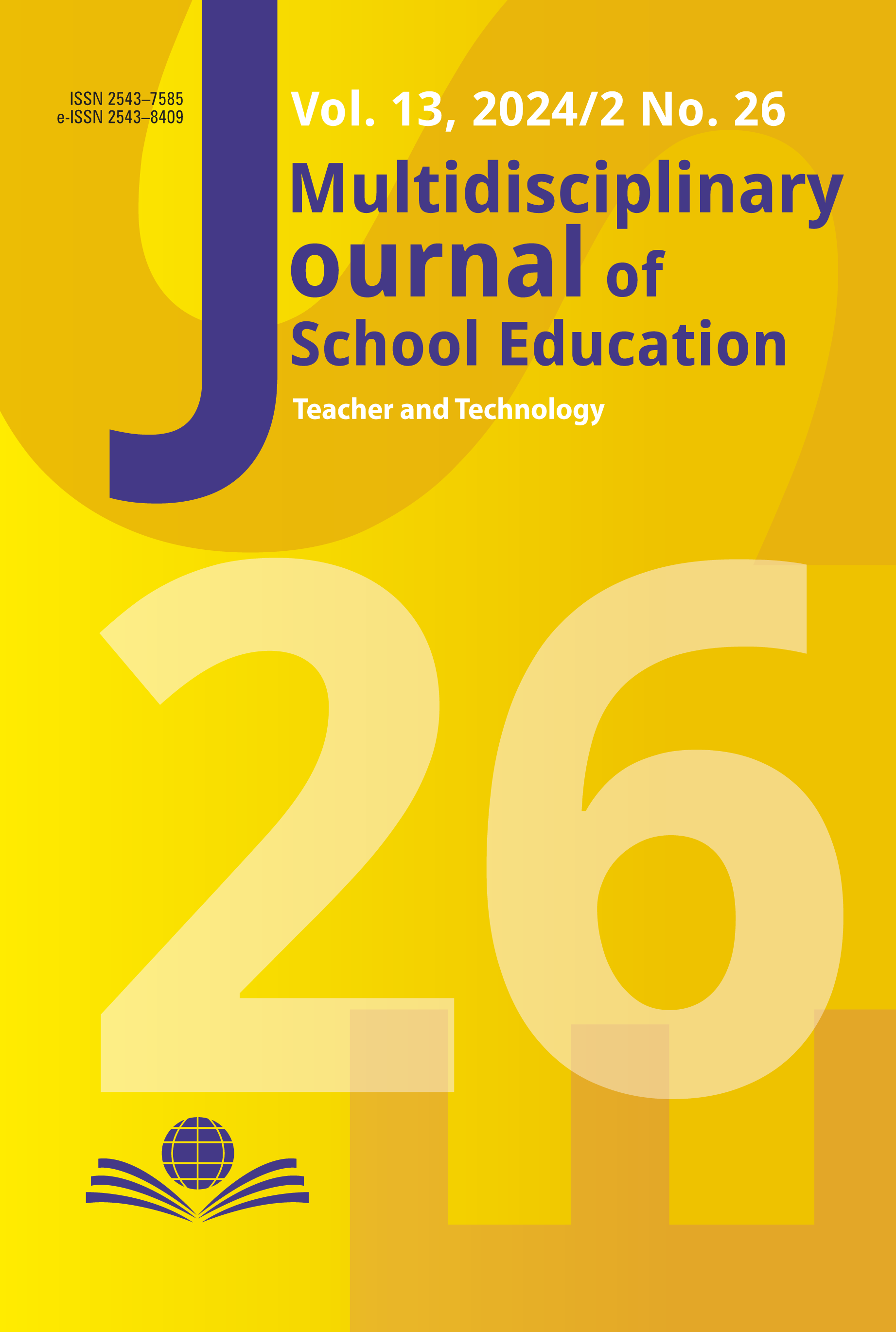Problems of Reversed Roles in the Family - Necessary Knowledge of the Teacher and Measures to Help Parentalized Students
Abstract
Research objectives (aims) and problem(s): The aim of this article is to examine the phenomenon of parentification, exploring its concept, characteristics, underlying causes, and both short-term and long-term consequences. Special attention is given to the imperative of spreading awareness of this phenomenon among educators. The research questions addressed include: What defines role reversal in families and what are its repercussions? How can teachers leverage specialized knowledge to implement support measures in schools?
Research methods: The article takes a theoretical and review-based approach, employing methods such as analysis of scientific literature and examination of existing data.
Structure of the article: The author delves into the phenomenon of parentification, beginning with an exploration of its definition and classification, while also considering the mechanisms that contribute to its occurrence. Additionally, she underscores its significance for the child’s present and future functioning, with both immediate and long-term consequences. Furthermore, the author emphasizes the necessity of diagnostic and supportive actions to be undertaken by teachers in response to this issue.
Research findings and their impact on the development of educational sciences: In this analysis, it was posited that parentification, defined as a reversal of roles within the family dynamic between parent and child, represents a complex and multifaceted process that is increasingly widespread in contemporary society. The ongoing societal shifts affecting modern families significantly contribute to the emergence of family role reversal. The article explores the current understanding of the phenomenon and highlights its practical implications for the role of teachers within the school environment.
Conclusions and/or recommendations: The article underscores the importance of enhancing teachers’ understanding of parentification and the challenges inherent in diagnosing this phenomenon. It suggests the utilization of specific projective methods for diagnosis, along with outlining potential forms of support and preventive measures that teachers can implement within the school setting.
References
Chase, N. (1999). An Overview of Theory, Research, and Societal Issues. In N. Chase (Eds.), Burdened Children (pp. 3–33). The Guliford Press.
Grzegorzewska, I. (2016). Parentyfikacja w rodzinach z problemem alkoholowym [Parentification in families with alcohol problems]. Alcoholism and Drug Addiction 29, 27–38. DOI: 10.1016/j.alkona.2016.03.004
Haxhe, S. (2016). Parentification and Related Processes: Distinction and Implications for Clinical Practice. Journal of Family Psychotherapy, 27(3), 185–199. DOI: 10.1080/08975353.2016.1199768
Jurkovic, G.J. (1997). The Plight of the Parentyfied Child. Brunner Mazel.
Rostowska, T., Borchet, J. (2016). Proces parentyfikacji w kontekście teorii systemowej [The process of parentification in the context of system theory]. Roczniki Pedagogiczne, 8(44)(3), 5-21. DOI:10.18290/rped.2016.8(44).3-1
Schier, K. (2016). Dorosłe dzieci. Psychologiczna problematyka odwrócenia ról w rodzinie [Adult children: Psychological aspects of role reversal in the family]. Wydawnictwo Scholar.
Schier, K. (2018). Formy pomocy niewidzialnym dzieciom, czyli tym, które doświadczyły odwrócenia ról w rodzinie [Forms of help to invisible children – children who experienced role reversal in the family]. Dziecko Krzywdzone. Teorie, badania, praktyka, 17(4), 28–50.
Żarczyńska-Hyla, J., & Piechnik-Borusowska, J. (2018). Dziecko w roli rodzica – pomylone role. O parentyfikacji w doniesieniach światowych i polskich [The child in a parentale role – confused family roles. World and Polish reports on parentification]. Wychowanie w rodzinie 17(1), 289-303. DOI: 10.34616/wwr2018.289.303
Żłobicki, W. (2018). Parentyfikacja jako proces odwrócenia ról w rodzinie [Parentification as a process of role reversal in the family]. Wychowanie w rodzinie 19(3), 341–353. DOI: 10.34616/wwr2018.3.341.353
Copyright (c) 2024 Anna Błasiak

This work is licensed under a Creative Commons Attribution-NoDerivatives 4.0 International License.
-
The Author/Authors declares/declare that their publication is original has not been published before and is not currently being considered for publication elsewhere and does not include borrowings from other works which might cause Publisher's responsibility, does not infringe the rights of the third party and that their copyright on this publication is not limited. The Author/Authors will incur all the costs and will pay compensations which might result from the mendacity of the following statement.
-
The Author/Authors declares/declare that issues about publication ethics, have been appropriately considered.
-
The Author/Authors agrees/agree to publish the article free of charge in Multidisciplinary Journal of School Education in English or Spanish. The Editorial Board reserves the right to shorten the texts and change the titles.
-
As part of free publication mentioned in § 1, the Author/Authors agrees/agree to make the full electronic version of their article available in the Internet.
- The Author/Authors agrees/agree to index their article in databases at home and abroad, including abstracts and keywords as well as Authors’ affiliation in English and in other languages. The Author/Authors agrees/agree to pass on the information mentioned above to the owners of these databases.
-
The Author/Authors declares/declare that the article is free of plagiarism.
-
The Author/Authors declares/declare that funding and conflict of interest information has been included in the article.
-
The Author/Authors accepts/accept that the author is aware of the consequences of scientific dishonesty, which, once detected, will be documented and disclosed to the public, and information about it will be communicated to the relevant institutions (universities employing the authors, scientific societies, publishing houses, etc.).
-
The Author/Authors declares/declare to publish the text in the Multidisciplinary Journal of School Education under a Creative Commons Attribution-NoDerivatives 4.0 International License (CC BY-ND 4.0).
- For one Author. Please complete the Author Statement and send it to the editorial office. Please download, complete, scan and attach the file in the system during the submission process.
Download: Author Statement -
For more than one Author. The Authors declare to bear complete responsibility for the scientific reliability of the article submitted. The detailed contribution of all co-authors is defined. Please complete the Authors Statement-Authorship Contributions and send it to the editorial office. Please indicate the specific contributions made by each author (list the authors’ initials, e.g., JKH). Please download, complete, scan and attach the file in the system during the submission process.
Download: Authors Statement - Authorship Contributions





